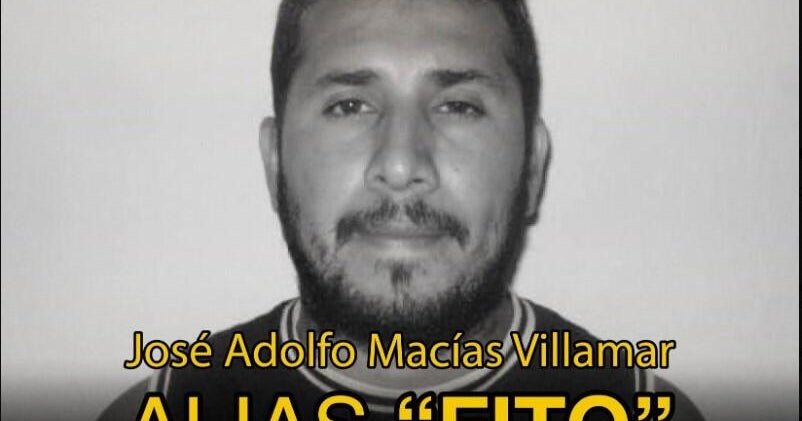In a significant turn of events, notorious drug trafficker José Adolfo Macías Villamar, also known as Fito, has been recaptured over a year after escaping from a high-security prison in Ecuador. His arrest was confirmed by Ecuadorian President Daniel Noboa, who highlighted the ongoing fight against organized crime in the nation. Macías, who leads the criminal gang “Los Choneros,” was captured in his hometown of Manta amidst serious drug trafficking allegations, including charges filed in the U.S.
| Article Subheadings |
|---|
| 1) Details of Macías’ Capture |
| 2) Previous Escape and Subsequent Events |
| 3) The Rise of Los Choneros |
| 4) Impacts of Organized Crime in Ecuador |
| 5) International Ramifications and Responses |
Details of Macías’ Capture
The recapture of José Adolfo Macías Villamar took place in Manta, Ecuador, where he was found in a concealed spot beneath a kitchen counter. This operation was executed by Ecuadorian military forces, who had received intelligence about Macías’ whereabouts. Officials confirmed that during the arrest, an officer had a gun aimed at the drug trafficker while he provided his full name, indicating a tense encounter. The return of Macías to custody marks a significant milestone in Ecuador’s struggle against drug-related crime.
Previous Escape and Subsequent Events
In early 2024, Macías orchestrated a dramatic escape from the Guayaquil Regional Prison. This incident raised alarms among security officials, as it occurred within the backdrop of increasing violence and turmoil in the country’s prisons. The authorities only learned of his escape when a military team arrived to transfer him to another facility but discovered that he was missing from his cell.
His escape sparked a series of violent incidents across Ecuador, leading to widespread riots, bombings, and even the assassination of a prominent prosecutor. This chaos forced the government to declare a state of emergency and crack down on the rampant violence associated with drug gangs. President Noboa later ordered measures to “neutralize” the criminal gangs operating within the country.
The Rise of Los Choneros
Los Choneros, the gang led by Macías, has been operational since at least 2020 and has established itself as one of the most violent organizations in Ecuador. According to U.S. authorities, the gang has connections to major Mexican cartels, which greatly enhance their drug trafficking operations. Their activities extend to international cocaine distribution, reportedly moving multi-ton quantities of the drug into the United States and other regions.
As a prominent figure within Los Choneros, Macías has developed a significant following, both among gang members and the public. While incarcerated, he maintained influence over gang activities, even releasing a video message to the “Ecuadorian people,” flanked by armed associates. His lifestyle in prison was characterized by excess, as reports reveal that he held parties and had access to various contraband items.
Impacts of Organized Crime in Ecuador
The presence of gangs like Los Choneros contributes to increasing instability within Ecuador. The ongoing turf wars among factions have led to unprecedented violence, threatening civilian lives and hindering law enforcement efforts. The U.S. government has classified Los Choneros as a terrorist organization, enhancing its scrutiny over the group and its activities.
The chaos ensuing from Macías’ escape illustrated the vulnerabilities within Ecuador’s prison system, which has been plagued by corruption, violence, and inadequate security measures. The U.S. Embassy in Ecuador has expressed concerns regarding the violent consequences tied to drug trafficking, pointing to a crisis exacerbated by weak governance and law enforcement.
International Ramifications and Responses
The repercussions of Macías’ activities extend beyond Ecuador, impacting international relations, especially with the United States. U.S. authorities have filed multiple charges against him, including international cocaine distribution and conspiracy related to arms smuggling. The indictment, unsealed in Brooklyn, highlights how Los Choneros utilize a network of assassins and traffickers that can evade law enforcement efforts.
Following his recapture, President Noboa announced plans for his extradition to the United States, as officials await a response regarding extradition protocols. This development not only underscores the collaborative efforts between Ecuador and the U.S. to combat drug trafficking but also highlights the global nature of organized crime.
| No. | Key Points |
|---|---|
| 1 | José Adolfo Macías Villamar, known as Fito, was recaptured in Manta after escaping from prison in 2024. |
| 2 | His escape resulted in widespread violence, including riots and the assassination of a prosecutor. |
| 3 | Macías leads “Los Choneros,” a gang with connections to powerful Mexican drug cartels. |
| 4 | Li Wu Wan has charged Macías with multiple counts of drug trafficking and conspiracy in the U.S. |
| 5 | Ecuador’s government is seeking the extradition of Macías following his recapture. |
Summary
The recapture of José Adolfo Macías underscores the urgent need for effective strategies in combating organized crime in Ecuador. With significant international implications stemming from his drug trafficking operations, the incident may provoke stronger governmental collaboration both domestically and abroad. As President Noboa continues to address these challenges, the recapture signifies a critical step towards restoring order and security in the region.
Frequently Asked Questions
Question: Who is José Adolfo Macías Villamar?
José Adolfo Macías Villamar, also known as Fito, is a fugitive drug trafficker and leader of the Ecuadorian gang Los Choneros, wanted for extensive drug trafficking operations.
Question: What charges does Macías face in the United States?
Macías faces multiple charges, including international cocaine distribution, conspiracy, and weapons offenses related to trafficking firearms into Ecuador.
Question: What impact has organized crime had on Ecuador?
Organized crime has led to increasing violence and instability in Ecuador, including riots, assassinations, and challenges to law enforcement and governance.


